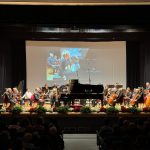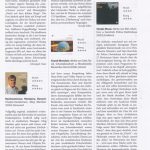musicweb-international
Robert SCHUMANN (1810-1856)
Piano Concerto in A minor, Op.54 (1845) [30:33]
Introduction and Allegro appassionato in G major, Op.92 for piano and orchestra (18:49) [15:48]
Introduction and Allegro Concertante in D minor, Op.134 for piano and orchestra (1853) [13:49]
Clara Wieck SCHUMANN (1819-1896)
Concerto Movement in F minor for piano and orchestra (1847)[13:09]
Oleg Marshev (piano)
South Jutland Symphony Orchestra/Vladimir Ziva
rec. Alsion, Sønderborg, Denmark, 3-7 August 2009. DDD
DANACORD DACOCD 688 [73:41]
I was first introduced to Robert Schumann’s Piano Concerto in A minor whilst still at school. I had been listening to my girlfriend of that time playing the opening salvos of Grieg’s concerto in the same key. I was impressed, naturally, and borrowed the score and an LP recording.
The sleeve-notes suggested that Grieg owed much to the Schumann concerto – in fact he had heard Clara play it in Leipzig in 1858. So the following day I began to explore the earlier piece. I must confess that it did not appeal to me quite as much as Grieg’s but as I have got older, I have come to enjoy and appreciate the exemplar as a beautiful and ultimately celebrated work.
It is beyond my ken to compare the 200 or so recordings of this concerto that are currently available. My criteria for awarding a gold star to any performance of this work are threefold. Firstly, do the soloist and the orchestra explore and reveal the structure and architecture of this work? It has been described in terms of being a ‘chamber’ work rather than a work in ‘heroic’ style, yet its ’emotionally charged’ nature should never be in doubt. Secondly, the technical requirement of this work is more in terms of a subtle exchange of views between piano and orchestra rather than in pyrotechnics. Does this work? And lastly – and perhaps most importantly – does the performance move me personally. On all these counts the present performance is extremely successful.
I believe that the key to understanding and ultimately appreciating this concerto is contained in a letter from the composer to his wife-to-be. He wrote quite simply, ‘I cannot write a concerto for virtuosi; I must think of something else.’ The result is intimate and often
conversational in its solution to the problem of writing a piano concerto. This may account for my youthful preference for the Grieg and Rachmaninov concertos which quite definitely are heroic in design and technical demands!
Two lesser-known concerted works by Robert Schumann are included in this excellent CD. Both works are explorations in less-usual forms as opposed
to the more ‘conventional’ works that would have guaranteed him a financial reward. This was much to the annoyance of his wife Clara who always had an ‘eye on commercial reward’. The earlier work was an Introduction and allegro appassionato in G major, Op.92 and the later
was an Introduction and allegro concertante in D minor, Op.134. There are ‘only’ 36 and 19 recordings of these two works respectively shown in the Arkiv catalogue. Yet both offer much and it is good that they have been recorded here. Probably, they will be known to Schumann
aficionados, but are not yet in the general repertoire.
The Introduction and allegro Appassionato, which was completed in 1849, opens with deliciously gentle music of great beauty that almost defies analysis. The piano plays arpeggios whilst the orchestra announces the theme – beautifully played on the French horns. Perhaps Mendelssohn is the inspiration for some of this music? Also, Schumann had been studying the works of Byron at this time, which most famously resulted in the Manfred Overture. The programme notes suggest that the brass fanfares of the ‘allegro’ movement suggest that Schumann ‘is still operating under the influence of this heady and heroic poetry.’ However, this section is full of varied material that completely contrasts with the opening
music. The pianist is given every opportunity to impress in this short fifteen minute work. Look out for the seeming reference to the opening of Beethoven’s Fifth Symphony!
The Introduction and Allegro Concertante in D minor was to be the composer’s last effort in concertante form. This piece was originally intended as a wedding anniversary present to Clara in September 1853. However after a visit from Johannes Brahms the composer had a rethink.
Hardly surprisingly, Robert was ‘bowled over’ by Brahms’ talent: he then dedicated the Allegro to him! I wonder what Clara felt about all this?
Once again the work opens quietly, with a thoughtful piano solo supported by pizzicato strings. It seems to ‘speak private musings aloud’. Yet as soon as the allegro is announced this mood is temporarily swept away, with the Byronic heroism once again coming to the fore. However, there is still much in this ‘fast’ music that is reflective and
sometimes even a little introverted. The work ends on a positive and powerful note.
It is a shame that Clara Wieck Schumann never managed to finish her Piano Concerto in F minor. As the liner-notes point out that this work must not be confused with her ‘A minor’ essay in the same genre which dates from her seventeenth year. It was some eleven years later, as the
wife of Robert and as the mother of seven children and as a successful concert pianist that she began to compose the present work. She did not complete more than 175 bars. Fortunately, the concerto was ‘realised’ by Jozef de Beenhouwer, a Flemish pianist and musicologist. Glancing at the Arkiv CD catalogues shows that there is currently no recording of it available. It is therefore good that Marshev has chosen to give this work what sounds like a definitive performance – I say that without the opportunity of perusing the score. Certainly the pianism and sheer
beauty of this music is explored in a movement lasting less than quarter of an hour. It would be easy to write this work off as a pastiche of her husband Robert infused with Clara’s beloved Chopin, but this would be to deny a considerable personal idiom which is wholly her own.
John France
Extremely successful.


